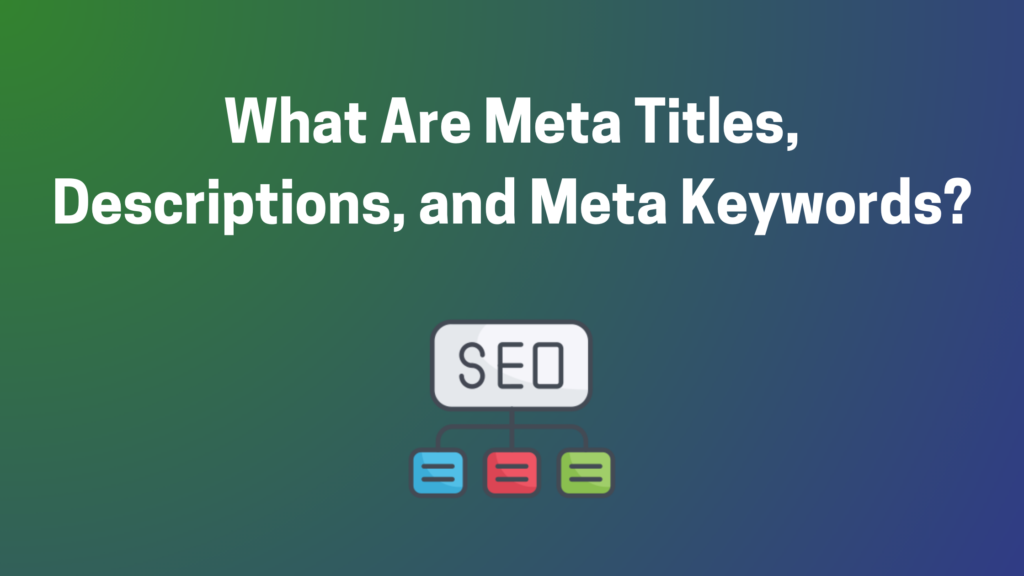
You might have heard the terms "meta title," "meta description," and "meta keywords." But what are they, and why should you care? Let's break it down in simple terms to help you understand and make the most of them for your website's SEO.
Meta Titles
Think of the meta title as the headline of your web page. It's the first thing people see in search engine results, like the title of a book. A good meta title tells both search engines and readers what your page is about. It's usually found at the top of your browser window when you're on a webpage, and it's also in the search results.
Meta Descriptions
Meta descriptions are like book blurbs. They provide a brief summary of what readers can expect on your webpage. While they don't directly impact your SEO ranking, they can encourage people to click on your page in search results. A well-written meta description can entice users to visit your site.
Meta Keywords
In the past, meta keywords were a big deal in SEO. They were like a book's index, filled with relevant words and phrases. However, search engines have become smarter and now focus more on content and context, so meta keywords are not as important as they once were. In fact, many search engines, like Google, don't use them at all.
Is Meta Title and Description Important for SEO?
Absolutely! Meta titles and descriptions are crucial for SEO. Here's why:
First Impressions
Your meta title and description are the first things users see in search results. A well-crafted, relevant meta title and description can make them more likely to click on your site.
Keyword Optimization
When you use relevant keywords in your meta title and description, it helps search engines understand the content of your page. This can improve your ranking for those keywords.
Increased Click-Through Rate (CTR)
A well-optimized meta description can increase your CTR, which is a strong signal to search engines that your page is valuable and relevant to users.
How Do I Make Meta Titles and Descriptions SEO-Friendly?
Now that we know they're essential, let's talk about how to create SEO-friendly meta titles and descriptions:
1. Be Clear and Concise:
Meta titles should be around 60 characters, and meta descriptions should be about 160 characters.
Use simple, clear language that accurately represents your page's content.
2. Include Keywords:
- Incorporate relevant keywords that people might use when searching for your content.
- Avoid keyword stuffing; use them naturally.
3. Unique Titles and Descriptions:
Each page on your website should have a unique meta title and description. Don't copy-paste the same ones everywhere.
4. Provide Value:
- Your meta description should give a hint of what users will find on your page and why it's valuable.
5. Use Action Words:
- Include action words like "Learn," "Discover," "Find," or "Get" to encourage clicks.
6. Avoid Special Characters:
- Special characters can make your titles and descriptions look messy in search results, so use them sparingly.
How to Optimize Meta Titles and Descriptions for SEO
Let's take a deeper dive into optimizing these essential elements:
1. Research Keywords:
Use keyword research tools to find relevant keywords for your content.
Focus on long-tail keywords, which are more specific and less competitive.
2. Create a Template:
Develop a template for your meta titles and descriptions to maintain consistency across your website.
3. Test and Update:
Monitor the performance of your meta titles and descriptions in search results.
Regularly update them to reflect changes in your content or audience preferences.
4. Mobile-Friendly:
Ensure that your meta titles and descriptions look good and are legible on mobile devices.
5. Analyze Competitors:
Look at what your competitors are doing and see if you can make your titles and descriptions stand out.
6. Schema Markup:
Consider using schema markup to enhance how your page appears in search results, including additional information like ratings, reviews, and more.
Conclusion
Meta titles and descriptions may seem like a small part of your website, but they play a crucial role in attracting visitors and improving your SEO. Keep them clear, concise, and full of relevant keywords to make your web pages shine in search engine results. Remember, the goal is to make your site as appealing and informative as possible to both users and search engines. Happy optimizing!







